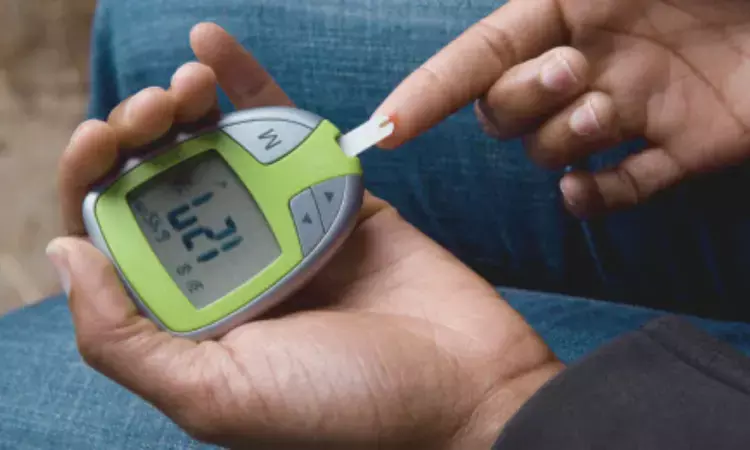- Home
- Medical news & Guidelines
- Anesthesiology
- Cardiology and CTVS
- Critical Care
- Dentistry
- Dermatology
- Diabetes and Endocrinology
- ENT
- Gastroenterology
- Medicine
- Nephrology
- Neurology
- Obstretics-Gynaecology
- Oncology
- Ophthalmology
- Orthopaedics
- Pediatrics-Neonatology
- Psychiatry
- Pulmonology
- Radiology
- Surgery
- Urology
- Laboratory Medicine
- Diet
- Nursing
- Paramedical
- Physiotherapy
- Health news
- Fact Check
- Bone Health Fact Check
- Brain Health Fact Check
- Cancer Related Fact Check
- Child Care Fact Check
- Dental and oral health fact check
- Diabetes and metabolic health fact check
- Diet and Nutrition Fact Check
- Eye and ENT Care Fact Check
- Fitness fact check
- Gut health fact check
- Heart health fact check
- Kidney health fact check
- Medical education fact check
- Men's health fact check
- Respiratory fact check
- Skin and hair care fact check
- Vaccine and Immunization fact check
- Women's health fact check
- AYUSH
- State News
- Andaman and Nicobar Islands
- Andhra Pradesh
- Arunachal Pradesh
- Assam
- Bihar
- Chandigarh
- Chattisgarh
- Dadra and Nagar Haveli
- Daman and Diu
- Delhi
- Goa
- Gujarat
- Haryana
- Himachal Pradesh
- Jammu & Kashmir
- Jharkhand
- Karnataka
- Kerala
- Ladakh
- Lakshadweep
- Madhya Pradesh
- Maharashtra
- Manipur
- Meghalaya
- Mizoram
- Nagaland
- Odisha
- Puducherry
- Punjab
- Rajasthan
- Sikkim
- Tamil Nadu
- Telangana
- Tripura
- Uttar Pradesh
- Uttrakhand
- West Bengal
- Medical Education
- Industry
Unstable Blood Sugar Levels Tied to Higher Erectile Dysfunction Risk in Men with Type 2 Diabetes: Study

China: A study published in the journal Endocrine found that blood glucose fluctuations are significantly linked to the risk of erectile dysfunction (ED) in men with type 2 diabetes mellitus (T2DM). Low time in range (TIR) emerged as an independent risk factor, highlighting the importance of stable blood glucose control.
Researchers emphasized that beyond achieving A1C targets, personalized glucose-lowering strategies should focus on minimizing fluctuations to reduce the frequency and duration of hyperglycemia and hypoglycemia. Maintaining blood glucose within the ideal target range could help lower the risk of ED in this patient population, underscoring the need for proactive clinical interventions.
T2DM is a well-known risk factor for vascular and neurological complications, which can impair erectile function. While persistent hyperglycemia has been linked to ED, recent evidence suggests that fluctuations in blood glucose levels may also play a critical role. Wu Dai, The Fifth Clinical Medical School of Anhui Medical University, Hefei, Anhui, People’s Republic of China, and colleagues aimed to explore the association between glucose fluctuations and erectile dysfunction in individuals with type 2 diabetes.
For this purpose, the researchers conducted a cross-sectional study involving 317 male patients with T2DM. Based on International Index of Erectile Function-5 (IIEF-5) scores, participants were classified into a non-ED group (76 cases) and an ED group (241 cases). They were further divided into quartiles according to TIR. Demographic and laboratory data were collected, and glucose fluctuation indicators were assessed using flash glucose monitoring.
The study revealed the following findings:
- The ED group had significantly lower TIR and IIEF-5 scores than the non-ED group.
- Higher TIR levels were associated with increased IIEF-5 scores and a significant decrease in ED incidence.
- Spearman’s correlation analysis showed a positive correlation between IIEF-5 scores and TIR (r = 0.48).
- Restricted cubic spline analysis indicated a negative linear relationship between TIR and ED.
- Multivariate logistic regression analysis, after adjusting for confounding factors, confirmed low TIR as an independent risk factor for ED.
The study highlights a significant correlation between glucose fluctuations and erectile dysfunction in patients with type 2 diabetes mellitus, with low time in range emerging as an independent risk factor.
Researchers emphasize the need for personalized blood glucose-lowering strategies beyond HbA1c targets to ensure stable glucose control. Prioritizing TIR can help minimize hyperglycemia and hypoglycemia, ultimately reducing ED risk and improving the quality of life for male T2DM patients.
Reference:
Yao, S., Xing, S., Shan, X. et al. Importance of assessing erectile dysfunction in patients with type 2 diabetes mellitus based on glucose fluctuation: a Cross-Sectional study. Endocrine (2025). https://doi.org/10.1007/s12020-025-04206-x
Dr Kamal Kant Kohli-MBBS, DTCD- a chest specialist with more than 30 years of practice and a flair for writing clinical articles, Dr Kamal Kant Kohli joined Medical Dialogues as a Chief Editor of Medical News. Besides writing articles, as an editor, he proofreads and verifies all the medical content published on Medical Dialogues including those coming from journals, studies,medical conferences,guidelines etc. Email: drkohli@medicaldialogues.in. Contact no. 011-43720751


